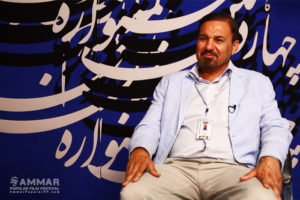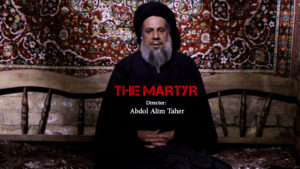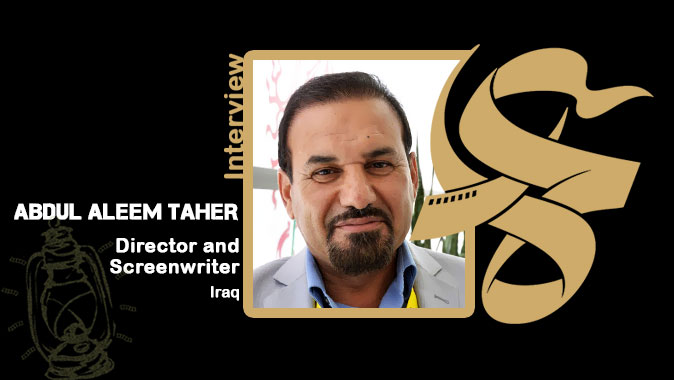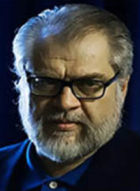TEHRAN (AIPFF) - Abdul Aleem Taher points to his concerns about making the film ‘Al-Shahid’ (the Martyr) and gives voice to his opinions about Iranian cinema and the importance of popular screening of films like Ammar Festival.
TEHRAN (AIPFF) – Ammar Popular Film Festival has conducted an interview with Abdul Aleem Taher at the time he took part in the 14th Resistance International Film Festival held in Tehran. In this interview he points to his concerns about making the film ‘Al-Shahid’ (The Martyr) and gives voice to his opinions about Iranian cinema and the importance of popular screening of films like Ammar Festival.
Born and brought up in Iraq, Abdul Aleem Taher graduated from Baghdad University in 1989. He was an active member in the 1991 Revolution in Iraq. Being sentenced to death, he was made to leave Iraq for the US in 1992. He took part in some workshops and film making courses, which led him to avail himself of the opportunity to cogitate on the world cinema and acquire skill in film making. Commencing his career in television and cinema in 2007, the film ‘Al-Shahid’ (The Martyr) is his first work.

Abdul Aleem Taher interviewed by AIPFF – Photo: Meisam Karimi
 What was your motivation to make your film?
What was your motivation to make your film?
Muhammad Baqir Al-Sadr, is the holiest revolution leader in our recent history in Iraq, and one of the people who participated in the 1991 protest against Saddam. He was a public leader that time because he was executed already. So he represent to me as the spiritual and holy leader for me and he is my heart for a long time. After the uprising I had to go out of the country because I was being executed. So I went to America and I was close to an international film making there and I was always telling myself that I have to make a movie about Martyr Muhammad Baqir Al-Sadr. Then after the fall of the regime (Saddam) in 2003, I returned to Iraq and that thing stayed in my mind and heart, that someday I must make a movie about Martyr Muhammad Baqir Al-Sadr. So by chance one of my friend who was a cleric man, he looked very similar to Muhammad Baqir Al-Sadr. So I said ok, this is the face that I wanted and there isn’t any excuses and I have to make the film. It was not easy. Because making film in Iraq is not that easy. It`s very challenging but Alhamdollelah God guided me through this and I produced the movie. The film is about stand against the government of Saddam in that time.
 Is it the first time you are in Iran?
Is it the first time you are in Iran?
No. if you are talking about visits, it is the fifth time I’m in Iran. But it is the third time that I come here for the movies. I was before in the Fajr Festival and there was a special festival about the movie in Tehran, a month ago. And for the third time, I’m here in the Resistance Festival.
 How much are you familiar with the Iranian cinema?
How much are you familiar with the Iranian cinema?
I was a little bit familiar before, but now I’m familiar as I coming more and more to Iran. I’m coming to love it because it is at the highest level and I was surprised actually. How did they reached this level in these recent years because I thought the level of the Iranian cinema is not that good you know? But when I saw the movies lately here, starting with “Muhammad, The Messenger Of God”, “Daughter”, “Bodyguard” and all these movies, they are great movie and I was very surprised actually for the level of the Iranian cinema.
 And how do you see your own country in cinema?
And how do you see your own country in cinema?
Unfortunately, cinema of my country is still at the low level because of the situation. The security situation of the country. The consternation of the government now is insecurity and fighting terrorism. And we have internal problems such as Daesh in Iraq. So the construction of the government establishments are not on cinema. Cinema is the last thing they think about. As a director, I suffered from that. Because I came to the point what I had to produce the movie, “The Martyr” movie by myself, from my own and my brother money. And after that I tried to get some financial help from Iraqi institutions, but I couldn’t get any. They said they have no money because they constraint on the fighting against terrorism. So I had to depend on myself and my brother`s help to produce my movie. So the cinema in Iraq is suffering and still down there.
 What do you think is the purpose of the cinema?
What do you think is the purpose of the cinema?
The purpose of the cinema is to celebrate the life; is to give this good feeling of hope to the people; is to teach the people. The purpose of the cinema is for the people to enjoy life. So there is many purposes for the cinema. Each movie has a purpose. I’m not exaggerating, it is one of the most influential tool that influence people around the world. The way we dress, the way we talk, the way we do. Everything is effected by the movies. So it has very big influence on communities.
 Do you think that right now, the cinema has a good influence on the people?
Do you think that right now, the cinema has a good influence on the people?
There is two kinds of cinema. There is cinema that is bad and evil and there is a good cinema. The evil cinema is the movies that trying to take people from their values, away from their religion. And we know that a lot of nudity are in these films and produce in all of the world. In the Hollywood, in Egypt, in India. And these movies are trying to take people away from truthful values and from their religion and their family values. On the other hand we have the good cinema that like to influence the people in a good way; teach them to stick from their values; tell them to celebrate their religion and keep their religion and morals. It is a war actually between two sides. This side and that side.
 Do you think the festivals can play a role in leading the cinema in a good way?
Do you think the festivals can play a role in leading the cinema in a good way?
Well, definitely. Films are made to be seen and participated in festivals. For example “The Martyr” film was valued when participated in this Resistance Festival and Fajr festival and another festival. So festivals are of course very important and it is all for me as a director and for the people who want to see the films from around the world; from Europe, from America, from Latin America, from everywhere.
 How do you see the festivals right now? Did they lead these films in a good way or not?
How do you see the festivals right now? Did they lead these films in a good way or not?
Definitely. They have positive roll and leading the cinema. When you celebrate the movies, you encourage the directors like me and other directors to make more movies. So of course it does lead the cinema. It is a progress. It leads the cinema to a better level. As far as technologies and the kinds of movies. Like I said earlier there is good cinema and bad cinema.
 And what is the commitment of the artists and the filmmakers in this field?
And what is the commitment of the artists and the filmmakers in this field?
Each one has his own commitment. Each director has his own intentions. For example my intention in Iraq is a going through the Martyr movie for instant. I want the young Iraqi generation know about this great man; this holy man. I want to show the evilness of Saddam in his government and the good people killed by Saddam. And to show this great character of our history. So, each film has its own intentions and each director has his own intentions and commitment. I want to produce such a movies that shows the reality of Iraq and the recent history of it which is full of tragedies and great stories. The only way to show the people in Iraq and around the world is to make films about these stories and tragedies. There is so many tragedies in our recent history.
 How do you promote your films? Is that just by the festivals?
How do you promote your films? Is that just by the festivals?
Unfortunately, in Iraq there is no movie theaters. So I can`t show my movies. I can`t even get the money back from showing my movies because there is no movie theater in Iraq. But in Iran there are movie theaters. So if somebody in Iran make a movie and show it in many theater maybe 100 theaters, he will get some money back here. And his movie will be promoted. But in Iraq we can’t promote the movies but in the festivals. There are limited festivals in Iraq. So I can give it to Iran to promote my movie. I’m thankful to this festival and other festivals to promote my movies.
 Our festivals which is Ammar Popular Film Festival, is founded by the people and we screen some films in some far places, like villages which do not have movie theaters. In far areas, some people may don’t have accesses even to the television and movie theater. We go to that places and screen the films for those people and let them to get some promotion from those films. Have you ever thought about this, to screen your films for some people where they do not have any accesses to the movie theater?
Our festivals which is Ammar Popular Film Festival, is founded by the people and we screen some films in some far places, like villages which do not have movie theaters. In far areas, some people may don’t have accesses even to the television and movie theater. We go to that places and screen the films for those people and let them to get some promotion from those films. Have you ever thought about this, to screen your films for some people where they do not have any accesses to the movie theater?
Well, actually we did that in Iraq. For “The Martyr” film we took our film to the farthest village in the marshes in Iraq called Chibayish. We showed our movie in public and more than 1 thousand people came to see while 300 people stood on their feet during the screening. Also we went to another village called Suq Al-Shuyukh on the south there. When I showed my movie in the national theater of Baghdad, I told the audiences this is my reward for those people in the farthest villages to see this movie and to get influenced and affected by it. So yes, actually I’m very willing to do that.

The film “The Martyr” directed by Abdul Aleem Taher
 So we sometimes ask the filmmakers to send us their films to screen them in these places. Right now we have thousands of screeners around Iran and they screen these films for people in different areas. Sometimes in mosques, in schools, at universities. They screen films for the people sometimes they sell tickets sometimes free of charge. Is it possible for you to screen these kinds of films in your own country for the people?
So we sometimes ask the filmmakers to send us their films to screen them in these places. Right now we have thousands of screeners around Iran and they screen these films for people in different areas. Sometimes in mosques, in schools, at universities. They screen films for the people sometimes they sell tickets sometimes free of charge. Is it possible for you to screen these kinds of films in your own country for the people?
Yes. So far in these villages screening was free for the people and we didn’t charge any money because people asked me. I hope God would reward me in the other world. God reward me for this movie. So we did that in Iraq and will do it again during Muharram and continue screening the movie in these villages. I’m ready to cooperate.
 Do you want to add anything special?
Do you want to add anything special?
I’m the fan of Iranian cinema, I hope the Iranian filmmakers will help Iraqi cinema to get up. There is no any effort in that direction. I hope filmmakers look the Iraqi cinema and help them to get up and become good cinema so we can make good movies. Because our culture is very similar, a good movie in Iraq will be good film in Iran too.
 Hope so. Thank you for participating in our interview.
Hope so. Thank you for participating in our interview.



